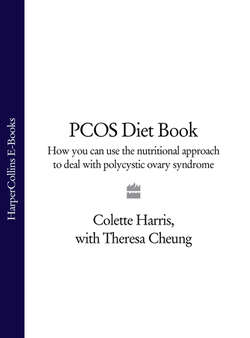Читать книгу PCOS Diet Book: How you can use the nutritional approach to deal with polycystic ovary syndrome - Theresa Cheung - Страница 34
Why?
ОглавлениеCarbohydrates are your body’s prime energy source. They enable your body to use protein for growth and repair. Your body also uses carbohydrates, or starches, to make blood-sugar (glucose), which provides fuel used by the brain and muscles, including the heart.
In a balanced state your bloodstream contains about 2 teaspoons of glucose. The carbohydrates that you eat easily supply this amount of glucose, and it’s all too easy to exceed the amount you need. The blood-sugar your body doesn’t use as fuel is stored as body fat, under control of the hormone insulin. With your body’s blood-sugar requirements so easily met, you don’t want to be eating foods which rapidly turn into glucose and cause sharp rises in your blood-sugar level, followed by a sharp rise in your insulin level, followed by storage of excess blood-sugar as fat – in other words, the familiar PCOS symptoms of insulin resistance and weight gain.
We aren’t telling you to eat fewer or more carbohydrates here. We’re saying eat the right kind of carbohydrates. That is, complex and with a low GI (glycemic index). The key is to get enough blood-sugar over a sustained period of time, rather than a roller-coaster of highs and lows. Complex carbohydrates tend to take longer to convert into glucose, giving you sustained energy. Simple sugars tend to raise blood-sugar and worsen insulin resistance, exacerbating the hormone imbalances and fatigue typical in PCOS. Low-glycemic index foods also take longer to break down in the stomach and release their sugars. That’s why you need to change the type of carbohydrate you eat rather than cutting them out altogether, and to make sure you combine them with protein – another way to help slow down the release of the sugars. Not eating carbohydrates is not healthy for women with PCOS in the long run. (At present, low-carb diets are fashionable. In Chapter 7 we’ll discuss this in more detail.)
